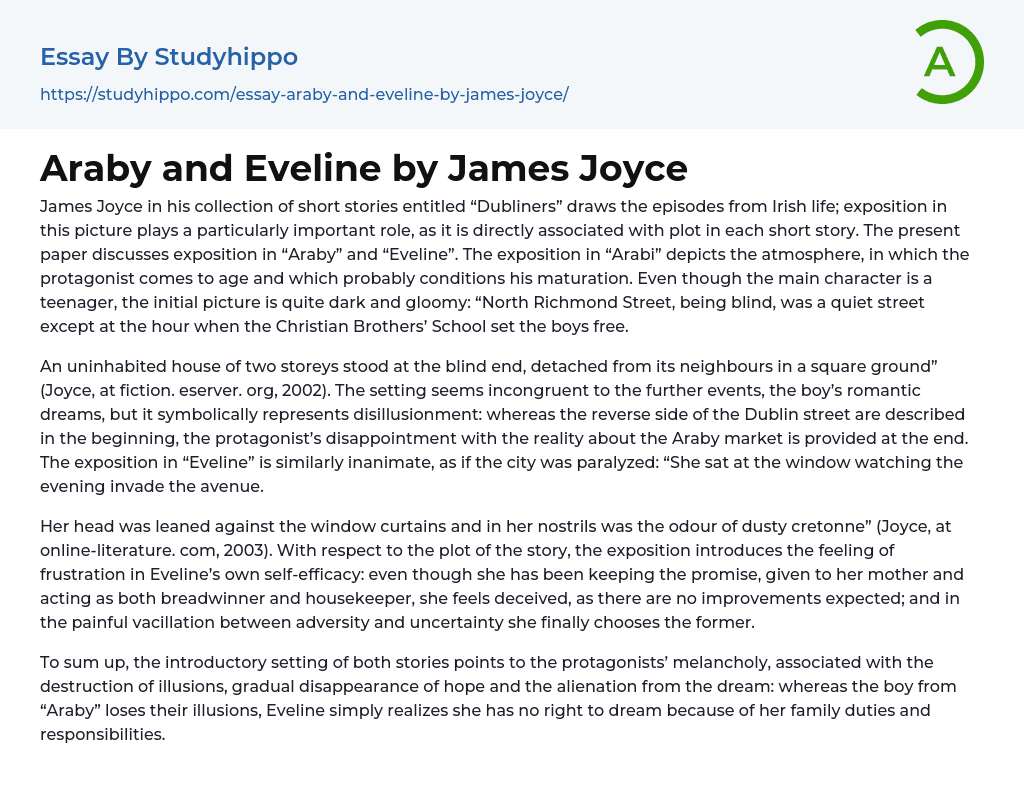James Joyce in his collection of short stories entitled “Dubliners” draws the episodes from Irish life; exposition in this picture plays a particularly important role, as it is directly associated with plot in each short story. The present paper discusses exposition in “Araby” and “Eveline”. The exposition in “Arabi” depicts the atmosphere, in which the protagonist comes to age and which probably conditions his maturation. Even though the main character is a teenager, the initial picture is quite dark and gloomy: “North Richmond Street, being blind, was a quiet street except at the hour when the Christian Brothers’ School set the boys free.
An uninhabited house of two storeys stood at the blind end, detached from its neighbours in a square ground” (Joyce, at fiction. eserver. org, 2002). The setting seems incongruent to t
...he further events, the boy’s romantic dreams, but it symbolically represents disillusionment: whereas the reverse side of the Dublin street are described in the beginning, the protagonist’s disappointment with the reality about the Araby market is provided at the end. The exposition in “Eveline” is similarly inanimate, as if the city was paralyzed: “She sat at the window watching the evening invade the avenue.
Her head was leaned against the window curtains and in her nostrils was the odour of dusty cretonne” (Joyce, at online-literature. com, 2003). With respect to the plot of the story, the exposition introduces the feeling of frustration in Eveline’s own self-efficacy: even though she has been keeping the promise, given to her mother and acting as both breadwinner and housekeeper, she feels deceived, as there are no improvements expected; and in the painful
vacillation between adversity and uncertainty she finally chooses the former.
To sum up, the introductory setting of both stories points to the protagonists’ melancholy, associated with the destruction of illusions, gradual disappearance of hope and the alienation from the dream: whereas the boy from “Araby” loses their illusions, Eveline simply realizes she has no right to dream because of her family duties and responsibilities.
- Book Summary essays
- Metaphor essays
- Reader essays
- Rhyme essays
- Literary devices essays
- Villain essays
- Books essays
- Genre essays
- Literary Criticism essays
- Writer essays
- Protagonist essays
- Simile essays
- Poem essays
- Book Report essays
- Book Review essays
- Greek Mythology essays
- Plot essays
- Tragic Hero essays
- Coming of Age essays
- Play essays
- Rhetoric essays
- Rhetorical Question essays
- Translation essays
- Understanding essays
- Reason essays
- Character essays
- Letter essays
- American Literature essays
- Literature Review essays
- Utopia essays
- Poetry Analysis essays
- Dante's Inferno essays
- Between The World and Me essays
- Incidents in The Life of a Slave Girl essays
- Flowers for Algernon essays
- Myth essays
- Everyday Use essays
- Boo Radley essays
- Genesis essays
- Richard iii essays
- Alice in Wonderland essays
- On the road essays
- Ozymandias essays
- The Nightingale essays
- Holden Caulfield essays
- Animal Farm essays
- 1984 essays
- A Hanging essays
- Shooting An Elephant essays
- A Tale Of Two Cities essays




